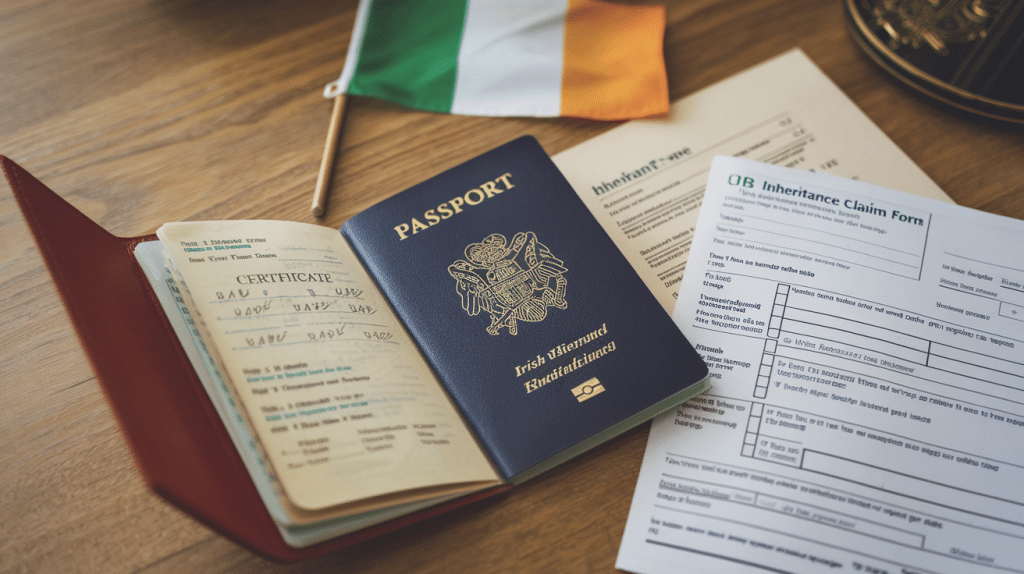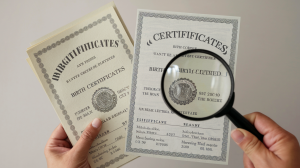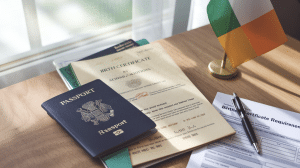Are you struggling to claim your rightful inheritance in Ireland? 🍀 The key to unlocking your family’s legacy might be hiding in plain sight – your Irish birth certificate. This powerful document isn’t just a record of your entry into the world; it’s a gateway to your ancestral rights and potential inheritance claims.
Navigating the complex world of Irish inheritance law can feel like searching for a pot of gold at the end of a rainbow. But fear not! Whether you’re a born-and-bred Irish citizen, adopted into an Irish family, or have Irish roots through your parents or grandparents, your birth certificate could be the golden ticket you’ve been looking for. In this post, we’ll unravel the mystery of Irish citizenship and reveal how your birth certificate can be the cornerstone of your inheritance claim.
Ready to embark on a journey through the emerald fields of Irish inheritance law? Let’s dive into the details of how to use an Irish birth certificate for inheritance claims, explore who qualifies as an Irish citizen by birth, and uncover the various paths to Irish citizenship – including birth abroad, adoption, and special declarations. 🌈
Introduction
Irish birth certificates play a crucial role in inheritance claims, serving as a vital link to one’s Irish ancestry and potential citizenship rights. These documents are more than just bureaucratic paperwork; they’re the key to unlocking your Irish heritage and the associated legal benefits.
Why Irish Birth Certificates Matter for Inheritance
- Proof of Irish Ancestry
- Establishing Citizenship Rights
- Legal Documentation for Claims
Irish birth certificates are essential for several reasons when it comes to inheritance claims:
- Proving Lineage: They provide irrefutable evidence of your Irish ancestry.
- Citizenship Verification: They can help establish your right to Irish citizenship.
- Legal Requirements: Many inheritance processes require official documentation.
Types of Irish Birth Certificates
| Type | Description | Relevance to Inheritance |
|---|---|---|
| Full Certificate | Contains all details | Most comprehensive for claims |
| Short Certificate | Basic information | May suffice for simple cases |
| Certified Copy | Official duplicate | Accepted for legal purposes |
Understanding the different types of Irish birth certificates can streamline your inheritance claim process. Each type serves a specific purpose and may be required depending on the complexity of your case.
As we delve deeper into this topic, we’ll explore the specific steps to use an Irish birth certificate for inheritance claims, ensuring you’re well-equipped to navigate this process.
How to use an Irish birth certificate for inheritance claims?

How to use an Irish birth certificate for inheritance claims?
An Irish birth certificate is crucial for inheritance claims as it proves your Irish ancestry. Simply present the certificate to the relevant authorities or solicitors handling the inheritance case. This document establishes your connection to Ireland and potential rights to inherit property or assets from Irish relatives, making it a key piece of evidence in the claim process.
Who is an Irish citizen by birth?
Born in Ireland before 1 January 2005
If you were born in Ireland before 1 January 2005, you are automatically considered an Irish citizen by birth. This applies regardless of your parents’ nationality or citizenship status. This rule was part of the jus soli principle, which granted citizenship based on place of birth.
Born in Ireland after 31 December 2004
For those born in Ireland after 31 December 2004, the rules are slightly different:
- At least one parent must be an Irish citizen or entitled to be an Irish citizen
- At least one parent must have been legally resident in Ireland for 3 out of the 4 years immediately preceding the child’s birth
These changes were introduced to address concerns about “birth tourism” and to align Irish citizenship laws with other European countries.
Born outside Ireland to an Irish parent
If you were born outside Ireland to at least one Irish parent, you may be entitled to Irish citizenship by descent. This applies to:
- Children born to an Irish citizen parent abroad
- Children with an Irish-born grandparent
| Generation | Eligibility |
|---|---|
| 1st Generation | Automatic citizenship |
| 2nd Generation | Citizenship by descent |
| 3rd Generation | Potential citizenship through Foreign Birth Registration |
Born in Ireland with no right to citizenship of another country
In cases where a child born in Ireland would otherwise be stateless, they are entitled to Irish citizenship. This provision ensures that every child has a nationality and complies with international conventions on statelessness.
Key points to remember:
- Citizenship rules changed significantly in 2005
- Parentage and residency now play a crucial role in determining citizenship
- Citizenship by descent is possible for those born abroad to Irish parents or grandparents
- Ireland provides citizenship to prevent statelessness
Now that we’ve covered who qualifies as an Irish citizen by birth, let’s explore Irish citizenship for those born abroad.
Irish citizenship when you are born abroad
A. Irish citizen parent born outside Ireland
If you have an Irish citizen parent who was born outside Ireland, you may be eligible for Irish citizenship. This is known as citizenship by descent. To claim Irish citizenship in this case, you’ll need to prove your parent’s Irish citizenship and your relationship to them. This can be done through official documents such as:
- Your parent’s Irish passport or citizenship certificate
- Your birth certificate showing your parent’s details
- Your parent’s birth certificate (if they obtained citizenship by descent)
B. Citizenship through descent from Irish grandparent
You can also claim Irish citizenship if one of your grandparents was born in Ireland, even if your parent wasn’t. This is sometimes referred to as the “grandparent rule.” To claim citizenship through this route, you’ll need to:
- Gather necessary documents (grandparent’s birth certificate, parent’s birth certificate, your birth certificate)
- Apply for Foreign Birth Registration (FBR)
- Wait for processing (current processing times may vary)
- Receive your FBR certificate
C. The following table may help to explain the situation:
| Scenario | Eligible for Irish Citizenship? |
|---|---|
| Parent born in Ireland | Yes, automatically |
| Parent Irish citizen by descent | Yes, but must register |
| Grandparent born in Ireland | Yes, through Foreign Birth Registration |
| Great-grandparent born in Ireland | No, unless parent already registered |
D. Other Irish ancestors
If your Irish ancestry goes back further than your grandparents, you may not be eligible for automatic citizenship. However, you might still have options:
- Naturalization through residency in Ireland
- Irish citizenship by marriage to an Irish citizen
- Special circumstances or discretionary cases
It’s important to note that Irish citizenship laws can be complex, and each case is unique. Consulting with the Irish embassy or a legal professional specializing in Irish citizenship can provide more tailored advice for your specific situation.
Irish citizenship through adoption
Adoption and Irish Citizenship
Adoption plays a significant role in Irish citizenship, offering a pathway for adopted children to obtain Irish nationality. This process ensures that adopted children have the same rights and privileges as biological children when it comes to inheritance claims.
Requirements for Irish Citizenship through Adoption
To qualify for Irish citizenship through adoption, the following criteria must be met:
- The adoption must be legally recognized in Ireland
- At least one adoptive parent must be an Irish citizen
- The adoption must have taken place after 1 January 1953
| Adoption Type | Citizenship Status |
|---|---|
| Domestic Adoption | Automatic Irish citizenship |
| Foreign Adoption | May require additional steps |
Inheritance Rights for Adopted Irish Citizens
Adopted Irish citizens have equal inheritance rights as biological children. This includes:
- Right to inherit from adoptive parents
- Eligibility for ancestral property claims
- Access to Irish inheritance tax benefits
It’s important to note that adoption severs legal ties with biological parents, potentially affecting inheritance from the birth family.
Documentation for Inheritance Claims
When using Irish citizenship through adoption for inheritance claims, the following documents are typically required:
- Irish adoption certificate
- Irish passport or citizenship certificate
- Proof of adoptive parents’ Irish citizenship
- Birth certificate (if available)
These documents serve as crucial evidence in establishing your right to Irish inheritance. With Irish citizenship through adoption, you gain not only a loving family but also a legal connection to Ireland’s rich heritage and potential inheritance opportunities.
Citizenship through special declaration
Special Declaration Process
To obtain Irish citizenship through special declaration, individuals must meet specific criteria and follow a particular process. Here’s a breakdown of the steps:
- Eligibility assessment
- Document gathering
- Application submission
- Review and decision
Eligibility Criteria
To qualify for citizenship through special declaration, applicants must meet one of the following conditions:
- Born in Ireland to non-Irish parents before 2005
- Born abroad to an Irish-born grandparent
- Born abroad to a parent who obtained Irish citizenship through naturalization or marriage before the applicant’s birth
| Condition | Eligibility |
|---|---|
| Born in Ireland (pre-2005) | Non-Irish parents |
| Born abroad | Irish-born grandparent |
| Born abroad | Parent naturalized/married before birth |
Application Process
- Gather required documents:
- Birth certificate
- Proof of Irish ancestry
- Passport-sized photographs
- Identity verification
- Complete the application form
- Pay the required fee
- Submit the application to the Irish Naturalisation and Immigration Service (INIS)
Once submitted, the INIS will review the application and make a decision. If approved, the applicant will receive a certificate of Irish citizenship, granting them the same rights as natural-born Irish citizens, including inheritance rights.
Now that we’ve explored citizenship through special declaration, let’s move on to additional resources and contacts for those seeking more information about Irish citizenship and inheritance claims.
Further information and contacts
Department of Foreign Affairs
The Department of Foreign Affairs plays a crucial role in matters related to Irish citizenship and inheritance claims. They provide essential services and information for those seeking to use their Irish birth certificate for inheritance purposes. Here’s a breakdown of their key functions:
| Function | Description |
|---|---|
| Passport Services | Issues Irish passports to eligible citizens |
| Consular Assistance | Offers support to Irish citizens abroad |
| Documentation | Provides official documents for legal purposes |
| Citizenship Queries | Handles inquiries about Irish citizenship |
For inheritance claims, the Department can assist with:
- Verifying the authenticity of Irish birth certificates
- Providing guidance on citizenship status
- Issuing supporting documentation for legal proceedings
Citizenship Division
The Citizenship Division is a specialized unit within the Irish government that deals specifically with citizenship matters. Their services are invaluable for those pursuing inheritance claims based on Irish ancestry:
- Processing citizenship applications
- Evaluating claims of Irish citizenship by descent
- Issuing certificates of Irish heritage
- Handling special declaration cases
Related Documents
When pursuing an inheritance claim using an Irish birth certificate, you may need additional supporting documents:
- Certificate of Irish Heritage
- Foreign Births Registration Certificate
- Naturalization Certificate
- Adoption Certificate (for those claiming citizenship through adoption)
- Marriage Certificate (if relevant to the inheritance claim)
Contact Us
For further assistance with using your Irish birth certificate for inheritance claims, you can reach out to:
- Irish Embassy or Consulate in your country
- Citizenship Division: citizenship@justice.ie
- Department of Foreign Affairs: dfa.ie/contact-us/
These resources will provide expert guidance on navigating the complexities of Irish citizenship and inheritance laws. Remember to have all relevant documents ready when making inquiries to expedite the process.
Obtaining an Irish birth certificate is a crucial step in establishing your eligibility for inheritance claims in Ireland. Whether you were born in Ireland, abroad to Irish parents, adopted by Irish citizens, or qualify through special declaration, understanding your citizenship status is essential. By following the appropriate procedures and gathering the necessary documentation, you can secure your rightful inheritance and connect with your Irish heritage.
Remember, the process of claiming Irish citizenship and using it for inheritance purposes can be complex. If you’re unsure about your eligibility or need assistance with the application process, don’t hesitate to reach out to the relevant Irish authorities or seek legal advice. Taking proactive steps to confirm your Irish citizenship status can open doors to your family’s legacy and ensure your rightful place in Ireland’s rich cultural tapestry.







